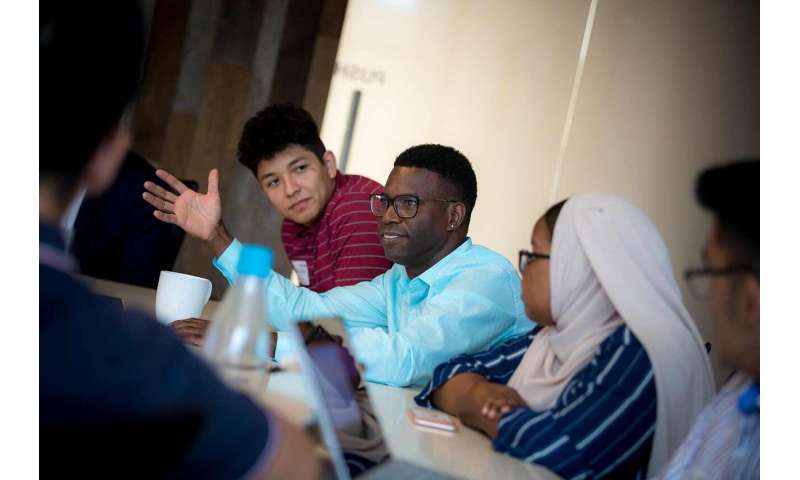Underrepresented UC San Diego students on a new path to STEM success

For most of his life, UC San Diego freshman Ronald Moreno grew up homeless. Shuffling from San Bernardino to Los Angeles to San Diego's City Heights community, Moreno and his younger brother spent their days in relatives' houses... sometimes staying in garages... at times sleeping in cars.
During all of this, Moreno maintained an affinity for the sciences, especially brain disorders—a natural curiosity spurred by a relative with schizophrenia. Thanks to a groundbreaking new program, Moreno is exploring the mysteries of the brain as a neurobiology major in the PATHways to STEM (PATHS) through Enhanced Access and Mentorship program. The initiative, launched by Biological Sciences Professor Gentry Patrick and Interim Program Director Leigh Eck, is designed to empower students from under-resourced communities and backgrounds to thrive in STEM at UC San Diego (see "Widening the Pathway to a STEM Career").
Now, through a new partnership funded by $6.9 million in grants from the Chan Zuckerberg Initiative (CZI) to UC San Diego and its collaborators, the PATHS program will be scaled to model the nation's most successful program for helping underrepresented students succeed in STEM fields.
"UC San Diego's new partnership with the Chan Zuckerberg Initiative is a welcomed addition to our existing efforts to increase the recruitment and retention of underrepresented students in science, technology, engineering and math," said UC San Diego Chancellor Pradeep K. Khosla. "This new collaboration will enhance our PATHS STEM scholarship program launched in 2017 by Professor Gentry Patrick, which created a new model of success for our students who come from underserved communities."
Under the new CZI collaboration, announced at an April 9 press conference, UC San Diego, UC Berkeley and the University of Maryland, Baltimore County (UMBC) will work toward a goal of replicating aspects of UMBC's Meyerhoff Scholars Program, recognized as one of the most effective models in the country to help inspire, recruit and retain underrepresented minorities pursuing undergraduate and graduate degrees in STEM fields. UMBC is a diverse public research university whose largest demographic groups identify as white and Asian, but which also graduates more African-American students who go on to earn dual M.D.-Ph.D. degrees than any other college in U.S.—a credit to the Meyerhoff program model.
The CZI grants will allow UC San Diego and UC Berkeley to apply many of the elements successfully used at UMBC, including outreach to high-achieving underrepresented high school students, research experiences, team learning, peer counseling, advising, preparation in the summer before matriculation and engagement with students' families.
"This partnership marks the beginning of a bold new strategy and commitment to support our underserved students in STEM," said Patrick, a neurobiology professor who also serves as the Division of Biological Sciences' director of mentorship and diversity. "If successful, it has the potential to transform the UC system at large."
"San Diego is a renowned research university with innovative outreach designed to advance our goal of educational equity and access," said Becky Petitt, vice chancellor for Equity, Diversity and Inclusion at UC San Diego. "Through their initiative, Priscilla Chan and Mark Zuckerberg are giving generous support that will touch the lives of students who are majoring in STEM fields—making UC San Diego a place of opportunity for any student in our region"
Before moving into UC San Diego's family housing, Moreno lived in City Heights, one of the most ethnically diverse communities in the country. His surroundings were mixed with gang violence, drug trafficking and other struggles.
"I can't imagine going to college without this (PATHS) scholarship, especially on the financial side of it," said Moreno. "For the first time my brother and I have a place we call home—our first bedrooms, bathrooms and kitchens."
Such stability is allowing Moreno to investigate all of the questions about the living world he has asked since he was a child. He now says he has a "fire" inside him, driving him on the road to discovery to understand all he can about neuroscience.
"The PATHS program has supported me, but above all it has taught me the idea of community," said Moreno. "At the end of the day it's not just about my own success. It's what I needed—an emphasis on community—and that's what the PATHS program did for me."
Provided by University of California - San Diego